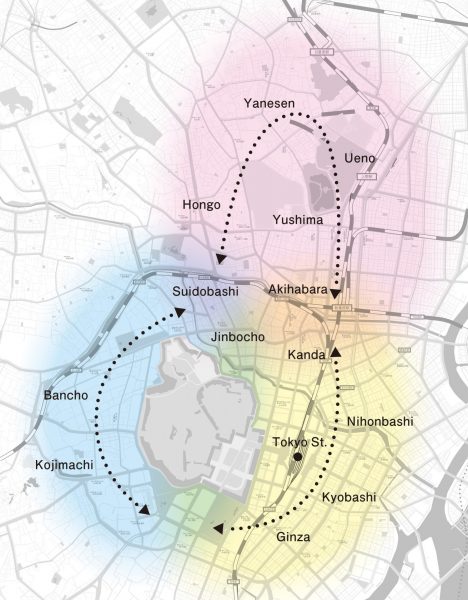From “me” to “us”
The city’s creativity reawakens, a space for open experimentation
Cultural activity has the power to connect disparate things, and to draw each of us together. With Tokyo’s accumulation of wide-ranging values and individual lifestyles, it is becoming difficult for people to see the “where, who, and what” of their surroundings. While the single existence of “me” stands out, we cannot grasp the reality of our neighborhoods, our past and future, and all that goes into “us” living here today.
Yet in Tokyo, or even greater society, “anxieties” felt by anyone at any place or time surely cannot be subdued by the thoughts or existences of the “individual”. We believe that when the individual consciousness of “me” expands to form the overarching consciousness of “us”, then for the first time, we may reach the center of our problems, in turn leading to solutions.
“The Japan International Art Exhibition (Tokyo Biennale)” was an international exhibition held in the Tokyo Metropolitan Art Museum in Ueno during the post-war reconstruction period. Among its continued years of exhibition, the 10th running in 1970 carrying the theme, “Between man and matter”, left a profound trace in the history of Japanese art. As half a century has passed, in a Tokyo where forms and methods of art have drastically changed, we seek to open the “Tokyo Biennale” in 2020 as a space to create and experiment with new frameworks.
Rather than an international event for the sake of art, through carefully taking in the cultural resources that dwell in the city and drawing out their possibilities, this is a framework for widening our consciousness and creative activities from “me” to “us”. Therefore, we not only call for artists to participate, as we take on an approach from all directions including art, design, architecture, town planning, and more.
Tokyo Biennale Citizens Committee Joint Representatives
Masato Nakamura (Artist)
Kazuko Koike (Creative Director)
October 2018
A new city and culture to call our own,
built by our own hands in our own place
The Tokyo Biennale aims at creating activities to become events shared by everyone through many kinds of encounters made between us all.
New groups of people have gathered in the area comprising of local citizens with deep roots, as well as those from all over Japan and the entire world. While all kinds of people are living, working, and enjoying the cosmopolitan city of Tokyo, art is what connects them from across different backgrounds as it brings to life our neighborhoods’ histories and draws out the future. From here, the concept of “us” emerges and each person may even discover a new “me”.
The key words are “art x community x industry” as we work with people in the area to build our own culture in our own place with activities surrounding the concepts of “HISTORY & FUTURE”, “EDUCATION”, “WELL-BEING”, and “RESILIENCY”.
The Tokyo Biennale is a celebration for the new city and culture that we ourselves will build.
Art x Community x Industry

HISTORY&FUTURE

EDUCATION

WELL-BEING

RESILIENCY
Venue Area
The Tokyo Biennale is set to take place mainly across the 4 wards – Chiyoda City, Chuo City, Bunkyo City, and Taito City – of the Northeastern area of central Tokyo. An area rich in historical and cultural value, it is known across the nation as a region with many spots of interest. Yet, there has never been a concrete program in which these neighboring regions work together.
Through its programming, the Tokyo Biennale will improve the circulation of people and activities, while building area branding, in order to picture the city in 2020 and beyond.

By utilizing established buildings and public institutions and places in the community, we will question how these have been used in the past, and will be used before and after exhibiting works for the Tokyo Biennale. Also these venues will reveal new potential in unknown places including the waterfront and other idle spaces in the area.
-
Examples:
- Historical architecture – architecture that co-exists with the history of Edo’s shift into the city of Tokyo
- Schools (School facilities, lawns, etc.) – utilizing schools located in the middle of local citizens’ neighborhoods
- Public space (Parks, streets, etc.) – places where people are coming and going
- Unused spaces – places with high potential that are currently not being used
- Spaces surrounding water – moats and rivers built during the Edo Period that still exist today, including their surroundings


